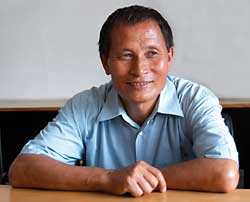 In 1997, Hari Prasad Farbangi met two men named Taranath and Resam in Kathmandu who offered to find him a job in Bangkok. He applied for a Thai visa and agreed to travel with them.
In 1997, Hari Prasad Farbangi met two men named Taranath and Resam in Kathmandu who offered to find him a job in Bangkok. He applied for a Thai visa and agreed to travel with them. While waiting for a taxi at Bangkok airport after arrival, police swooped on the three of them. Resam was caught with 13kg of hashish, but managed to escape. Taranath and Hari Prasad were caught.
"I was terrified, I had no idea why they were arresting us," Hari Prasad recalls. He could have escaped, but didn't because he hadn't done anything wrong. Later, the Thai customs officer demanded a 20,000 baht bribe but he didn't have that kind of money. Officials seized his passport and possessions and packed him off to Klong Prem-Lard Yao Prison in Bangkok.
Ignoring advice from other Nepali inmates, Hari Prasad hired a lawyer to fight back. His family in Nepal sent all their savings, Rs 600,000, to pay a private lawyer who advised him to plead guilty for a reduced sentence. Hari Prasad refused and got a six years. Later, Taranath told the court Hari Prasad had nothing to do with the drugs, but the judge refused to commute the sentence.
During his jail term, Hari Prasad came across many Nepalis who were in much more serious trouble. There are 12 Nepali inmates at Lard Yao, some of them women. At Bangkwang Prison outside Bangkok, there are 50 Nepali prisoners, many of them serving life or 50-year terms for drug offences. Nearly all claim innocence and say they were framed by traffickers.
"There are many innocent Nepalis like me jailed without proof," says Hari Prasad, citing the example of a fellow inmate, 54-year-old Wangyal Ghale who is in for life. "Wangyal is in the worst condition and will not survive for very long," Hari Prasad says, "his state of mind has deteriorated, he forgets to eat and hardly sleeps." Wangyal has already spent 20 years in prison, and since inmates have to buy their own medicines, gets no medical support from the prison authorities.
Nuri Sherpa, another 50-year-old at Lard Yao, suffers from chronic ulcer, hypertension and other ailments. Other prisoners have asthma, heart disease, insomnia, kidney and advanced glaucoma. In November 2003, inmate Harka Bahadur Pun died of tuberculosis. At Bombat Prison, prisoner rights activists say, Nepali prisoners face abuse, including being constantly clamped in leg irons.
Nepali prisoners often fare worse than others in Thailand because they don't get money from family to bribe guards, the Nepali embassy in Bangkok takes no interest in them and they are bullied by other inmates. European, Japanese or American prisoners get regular visits from their embassies who help with pocket money as well as extradition procedures.
Luckily for the Nepali prisoners, there are international and Thai activists who have come to the rescue. If it wasn't for Peter Foster and his wife in England, for instance, Hari Prasad would have no money to pay his airfare home after release.
Another activist is American computer engineer, Ben Parks, who has taken the welfare of Nepali prisoners as a personal crusade. Then there are Christian groups in Thailand who visit the inmates regularly bringing food, medicine and other essentials. As a result, many of the Nepali prisoners have converted to Christianity. The Nepali prisoners now have their own website so that relatives and friends can get updates on their health, release, extradition, or the possibility of a royal pardon. (www.ptet-nepal.org)
Parks has been trying to find ways to push through the extradition of the prisoners to Nepal, and although the Thai government seems amenable there isn't much interest in Kathmandu's officialdom. He is also helping relatives apply for a royal pardon from Thai King Bhumibol on his birthday. The Nepali embassy in Bangkok is supposed to process these pardon applications, but keeps losing them. Says Hari Prasad: "The king's pardon is their only hope."
At 50, Hari Prasad is still not used to not living inside his cell walls, and says he would have died without the support of his family, friends and the people on the other side of the world that he has never met. When he came back, Hari Prasad was welcomed with open arms and a huge party in his honour that reduced him to tears. What now, we asked him. "I will go back to Pokhara and become a farmer," Hari Prasad told us. "No more big dreams."


